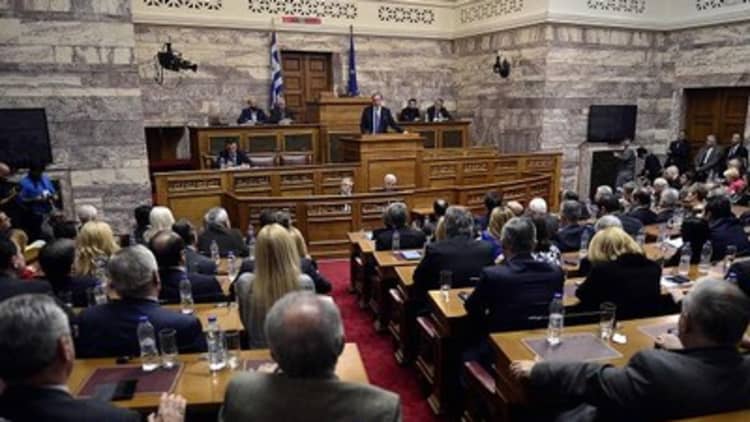
The euro held its ground on Monday in the face of renewed nerves over Greece prompted by a failed attempt to elect a new president, leaving the country facing an early national election which could derail its bailout program.
The euro remained rooted close to a 28-month trough against the dollar, but did not dip beneath that low, with traders citing thin trade and already stretched short euro positions.
Greek Prime Minister Antonis Samaras said on Monday he would propose holding an election on Jan. 25, after his candidate Stavros Dimas fell short of the 180 votes needed to become president.
Read MoreUS economic recovery finally taking hold
The national election could result in a government led by the leftist Syriza party, which wants to wipe out a big part of Greece's debt and cancel the terms of a bailout from the European Union and International Monetary Fund that Greece still needs to pay its bills.
Greek bond yields shot higher after the vote as investors took fright, with the borrowing costs on 10-year bonds rising to 9.7 percent, up around 117 basis points on the day, while the safe-haven German equivalents fell to a record low of 0.564 percent.
"It's hard to square what's happening with Greek bond yields against the lack of activity in the euro," said Neil Mellor, a currency strategist at Bank of New York Mellon in London. "It will be a volatile start to the year as the news from Greece sinks in."
The euro edged up 0.2 percent to trade at $1.2200, still close to its low of $1.2165 hit last week.
"We believe the return of political uncertainty to Greece could trigger an acceleration of the euro's downtrend," wrote UBS FX strategist Gareth Berry in a research note, adding that a dip below $1.20 in the run-up to the vote was a "distinct possibility."
Read MoreGreek stocks tank as snap election called
Activity in general was thin and is likely to remain that way ahead of the New Year holiday with many investors having already closed out their positions for the year. Japanese markets will be shut from Dec. 31-Jan. 2 and reopen on Jan. 5.
While investors are betting the euro will fall against the dollar next year as speculation grows that the European Central Bank will ease monetary policy more aggressively, it may not depreciate at all against currencies of other major trading partners.
Sterling edged down 0.1 percent to $1.5548.


